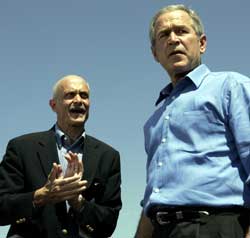| Home | Blog | Ask This | Showcase | Commentary | Comments | About Us | Contributors | Contact Us |

Five years and billions of dollars later: Still too many unanswered questions about homeland securityASK THIS | August 214, 2006James Forest, who teaches terrorism studies at West Point, wonders if government agencies charged with protecting the homeland have gradually reverted to business as usual, where policies are influenced by political expediency rather than a genuine response to threats. First in a series about homeland security. By James JF Forest Q. What are the most realistic threats to the homeland? Could terrorists use our own critical infrastructure against us, drawing lessons from the devastation of Hurricane Katrina? Have the billions Congress has appropriated for aviation security since 9/11 made America safer, or merely shifted the risk of terrorist attack from civil aviation to other targets, such as our ports, chemical industry, or shopping malls? Q. By what criteria can the DHS be considered fully functional? Who is gathering and evaluating data to inform decision-makers about this organization’s functional readiness, lagging weaknesses, political/bureaucratic seams, and other issues that impact the ability of DHS agencies and personnel to effectively protect the homeland? Q. What can be done to improve cooperation and coordination at the federal, state and local levels in preventing, preparing for and responding to threats to the homeland? Have government agencies gradually reverted to business-as-usual, with policy bounded by the politically feasible rather than a recognition of the threat? Q. What kinds of partnerships can the U.S. develop with other nations that would ensure their assistance in achieving our homeland security objectives? What more can we do to tackle the wide range of global issues (including failing states, border insecurity, smuggling and transnational crime) that have been shown to play a direct role in our own national security challenges? Q. What do we know about the true nature of the terrorist threat against the U.S.? What are the strategic objectives of particular terrorist groups? Why is it important for both policymakers and everyday citizens to understand the strategic motivations behind terrorist attacks? Why would a terrorist group potentially seek to attack a small or mid-sized city in the U.S. instead of a major metropolitan area? It has been five years since America awoke to the strategic reality of this age -- that a handful of individuals, armed with little more than cunning and resolve, can carry-out catastrophic attacks on our own soil. Regardless of our eventual success against Al Qaeda and the broader war on terror, this strategic reality will never go away. Homeland security is a permanent and daunting requirement of our federal, state and local authorities. Protecting our nation’s communities and critical infrastructure -- particularly our water, food and energy supplies, transportation systems, and financial and technical infrastructure -- is clearly one of the government’s most fundamental responsibilities. Critics claim that despite enormous amounts of time, money, and political promises, the nation is no safer today than after 9/11. On December 5, 2005, the ten former members of the 9/11 Commission, working together as a private group called the 9/11 Public Discourse Project (PDP), released a 5-page final report, which included a one-page report card assigning mediocre or failing grades to the federal government’s implementation of almost all of the 41 recommendations in the 9/11 Commission Report released in July 2004.While the magnitude of the national effort is certainly impressive, its effectiveness remains uncertain.
America has certainly expended enormous effort on these issues since 9/11, and homeland security remains the fastest growing portion of the federal budget. Congress has passed a broad range of landmark legislation. Federal departments and agencies have initiated or expanded an enormous number of initiatives and programs (some of them controversial), including:
Meanwhile, state and local governments have developed new incident management procedures, conducted thousands of training exercises, spent billions improving their emergency response capabilities, have expanded or established counterterrorism divisions within their police departments, and have strengthened their habitual working relationships with federal counterparts. And yet, as has been reported in the media recently, the FBI is still notoriously unwilling to share intelligence with other federal, state and local agencies, despite recent policy decisions at the highest levels of the Bush administration. Clearly, it is important that momentum in the direction of greater interagency collaboration be sustained for many years to come. The role of international cooperation Homeland security encompasses an important and complex foreign dimension. Each year, millions of cars, trucks, freight cars and containers enter the U.S. through our maritime ports, borders and airports. The task of screening each of these, along with nearly half a billion people each year who come through our ports of entry, is clearly an impossible one. Thus, the very idea of homeland security requires a commitment to global intelligence and security cooperation, in order to address the threat to American before it ever reaches our shores. Unfortunately, coordination between the arenas of domestic and foreign policy is anything but seamless. In our federalist system of government, the constitutional and statutory authorities that enable the executive to act so decisively outside our borders are very different than the authorities that tend to constrain the executive within our borders. Nevertheless, recognizing the foreign policy dimension of homeland security, the U.S. Government has negotiated a long list of international agreements, including:
Despite the Bush Administration’s unilateralist reputation, the U.S. government has had substantial success in working through established international organizations (the International Maritime Organization, the International Civil Aviation Organization, and the World Customs Organization) to create internationally recognized standards and procedures in such areas as aviation security, electronic cargo manifesting, and use of biometric technology.However, beyond international agreements, the U.S. must also commit itself to global capacity-building efforts, particularly in countries from which large portions of our imports come from. Many countries lack the necessary critical infrastructure, corruption-free law enforcement, and other elements that would ensure a high level of security at the point of origin for the containers that are shipped to our nation’s ports of entries. But building capacity is expensive, and our spending is concentrated more on overseas military engagements than on creating an enabling environment for better security relationships worldwide. Understanding the terrorists Finally, understanding the nature of the terrorist threat is an important aspect of effective policymaking and public resilience. Too often, politicians and pundits have misrepresented the reasons why a particular group of individuals would seek to conduct terror attacks against Americans. For the most part, our freedoms, values, or way of life are not motivating factors behind a terrorist attack. Rather, terrorist is typically adopted as a strategy by groups seeking to change something in the world (the overthrow of a government, ethnic separatism, etc.). Think tanks like RAND (http://www.rand.org) and the Combating Terrorism Center at West Point (http//ctc.usma.edu) are producing a growing body off analysis on terrorist strategies and motivations which help us understand the threat, and thus contribute much to our shared mission of homeland security.
|




